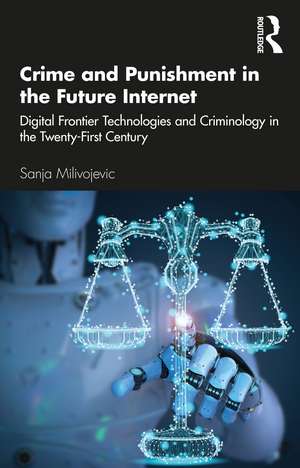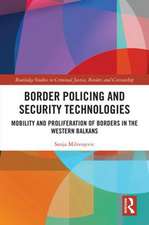Crime and Punishment in the Future Internet: Digital Frontier Technologies and Criminology in the Twenty-First Century
Autor Sanja Milivojevicen Limba Engleză Paperback – 22 apr 2021
Crime and Punishment in the Future Internet is an examination of the development and impact of digital frontier technologies (DFTs) such as Artificial Intelligence, the Internet of things, autonomous mobile robots, and blockchain on offending, crime control, the criminal justice system, and the discipline of criminology. It poses criminological, legal, ethical, and policy questions linked to such development and anticipates the impact of DFTs on crime and offending. It forestalls their wide-ranging consequences, including the proliferation of new types of vulnerability, policing and other mechanisms of social control, and the threat of pervasive and intrusive surveillance.
Two key concerns lie at the heart of this volume. First, the book investigates the origins and development of emerging DFTs and their interactions with criminal behaviour, crime prevention, victimisation, and crime control. It also investigates the future advances and likely impact of such processes on a range of social actors: citizens, non-citizens, offenders, victims of crime, judiciary and law enforcement, media, NGOs. This book does not adopt technological determinism that suggests technology alone drives social development. Yet, while it is impossible to know where the emerging technologies are taking us, there is no doubt that DFTs will shape the way we engage with and experience criminal behaviour in the twentyfirst century. As such, this book starts the conversation about a range of essential topics that this expansion brings to social sciences, and begins to decipher challenges we will be facing in the future.
An accessible and compelling read, this book will appeal to those engaged with criminology, sociology, politics, policymaking, and all those interested in the impact of DFTs on the criminal justice system.
| Toate formatele și edițiile | Preț | Express |
|---|---|---|
| Paperback (1) | 245.00 lei 3-5 săpt. | +10.93 lei 7-13 zile |
| Taylor & Francis – 22 apr 2021 | 245.00 lei 3-5 săpt. | +10.93 lei 7-13 zile |
| Hardback (1) | 1040.37 lei 6-8 săpt. | |
| Taylor & Francis – 22 apr 2021 | 1040.37 lei 6-8 săpt. |
Preț: 245.00 lei
Preț vechi: 306.24 lei
-20% Nou
46.88€ • 50.13$ • 39.09£
Carte disponibilă
Livrare economică 27 martie-10 aprilie
Livrare express 13-19 martie pentru 20.92 lei
Specificații
ISBN-10: 036746800X
Pagini: 148
Dimensiuni: 138 x 216 x 18 mm
Greutate: 0.2 kg
Ediția:1
Editura: Taylor & Francis
Colecția Routledge
Locul publicării:Oxford, United Kingdom
Public țintă
Postgraduate and Undergraduate AdvancedCuprins
Notă biografică
Recenzii
Associate Professor Marie Segrave, Monash University, Australia
In "Crime and Punishment in the Future Internet" Sanja Milivojevic invites us to look into the future and actively engage with digital frontier technologies that, as she skilfully shows, bring risks as well as possibilities into our lives. It as a brave and, above all, imaginative book that opens important debates about the nature of crime and punishment that even techno-sceptics and techno-phobes among us can no longer ignore. It made me think- it still does - and this is all one can ask of a book.
Professor Katja Franko, University of Oslo, Norway
Crime and Punishment in the Future Internet is a remarkable achievement, distilling complex technological concepts and criminological debates into a concise, accessible and highly thought-provoking text. As digilization advances rapidly, Milivojevic's book will be essential reading for students and scholars of Criminology seeking to understand emerging landscapes of technology, crime and control.
Professor Dean Wilson, University of Sussex
Descriere
Crime and Punishment in the Future Internet is an examination of the development and impact of digital frontier technologies (DFTs) such as Artificial Intelligence, the Internet of things, autonomous mobile robots, and blockchain on offending, crime control, the criminal justice system, and the discipline of criminology. It poses criminological, legal, ethical, and policy questions linked to such development and anticipates the impact of DFTs on crime and offending. It forestalls their wide-ranging consequences, including the proliferation of new types of vulnerability, policing and other mechanisms of social control, and the threat of pervasive and intrusive surveillance.
Two key concerns lie at the heart of this volume. First, the book investigates the origins and development of emerging DFTs and their interactions with criminal behaviour, crime prevention, victimisation, and crime control. It also investigates the future advances and likely impact of such processes on a range of social actors: citizens, non-citizens, offenders, victims of crime, judiciary and law enforcement, media, NGOs. This book does not adopt technological determinism that suggests technology alone drives social development. Yet, while it is impossible to know where the emerging technologies are taking us, there is no doubt that DFTs will shape the way we engage with and experience criminal behaviour in the twentyfirst century. As such, this book starts the conversation about a range of essential topics that this expansion brings to social sciences, and begins to decipher challenges we will be facing in the future.
An accessible and compelling read, this book will appeal to those engaged with criminology, sociology, politics, policymaking, and all those interested in the impact of DFTs on the criminal justice system.


















